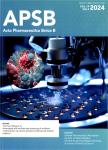Rhizospheric microbial communities are driven by Panax ginseng at different growth stages and biocontrol bacteria alleviates replanting mortality
Rhizospheric microbial communities are driven by Panax ginseng at different growth stages and biocontrol bacteria alleviates replanting mortality作者机构:Key Laboratory of Beijing for Identification and Safety Evaluation of Chinese Medicine Institute of Chinese Materia Medica China Academy of Chinese Medical Sciences
出 版 物:《Acta Pharmaceutica Sinica B》 (药学学报(英文版))
年 卷 期:2018年第8卷第2期
页 面:272-282页
核心收录:
学科分类:1008[医学-中药学(可授医学、理学学位)] 1007[医学-药学(可授医学、理学学位)] 1004[医学-公共卫生与预防医学(可授医学、理学学位)] 1001[医学-基础医学(可授医学、理学学位)] 10[医学]
基 金:supported by grants from the National Science Foundation of China(81603238)
主 题:Panax ginseng Microbial communities Replanting problem High-throughput sequencing Different ages Bioremediation
摘 要:The cultivation of Panax plants is hindered by replanting problems, which may be caused by plantdriven changes in the soil microbial community. Inoculation with microbial antagonists may efficiently alleviate replanting issues. Through high-throughput sequencing, this study revealed that bacterial diversity decreased,whereas fungal diversity increased, in the rhizosphere soils of adult ginseng plants at the root growth stage under different ages. Few microbial community, such as Luteolibacter, Cytophagaceae, Luteibacter, Sphingomonas,Sphingomonadaceae, and Zygomycota, were observed; the relative abundance of microorganisms, namely,Brevundimonas, Enterobacteriaceae, Pandoraea, Cantharellales, Dendryphion, Fusarium, and Chytridiomycota,increased in the soils of adult ginseng plants compared with those in the soils of 2-year-old seedlings. Bacillus subtilis 50-1, a microbial antagonist against the pathogenic Fusarium oxysporum, was isolated through a dual culture technique. These bacteria acted with a biocontrol efficacy of 67.8%. The ginseng death rate and Fusarium abundance decreased by 63.3% and 46.1%, respectively, after inoculation with B. subtilis 50-1. Data revealed that microecological degradation could result from ginseng-driven changes in rhizospheric microbial communities;these changes are associated with the different ages and developmental stages of ginseng plants. Biocontrol using microbial antagonists alleviated the replanting problem.



